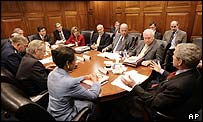Untitled Document
 |
| John Negroponte (third from right at table) will
oversee the FBI changes |
US President George W Bush has ordered the creation of a domestic intelligence
service within the FBI, as part of a package of 70 new security measures.
The White House says it is enacting the measures to fight international terrorist
groups and prevent the spread of weapons of mass destruction.
The authorities will also be given the power to seize the property of people
deemed to be helping the spread of WMD. An independent commission recommended
the measures earlier this year.
The new measures form part of Mr Bush's overhaul of US intelligence agencies,
aimed at bolstering the fight against terrorism and weapons proliferation.
FBI overhaul
The FBI is to be re-organised, and will include another new intelligence body
called the National Security Service.
It will assume responsibility for intelligence work within the US, and combine
the Justice Department's intelligence, counter-terrorism and espionage units.
Correspondents say the measure is designed to help dissolve the barriers between
the FBI and the CIA.
John Negroponte, who was given the new job of US director of national intelligence
in April, will be charged with putting the changes into effect.
Other measures include:
An executive order allowing US authorities to seize the assets of any person
or any company thought to be aiding the spread of WMD, targeting specifically
eight companies including two from North Korea, one from Iran and one from Syria
The establishment of a national counter-proliferation centre, to centralise
US efforts to stop the spread of nuclear, chemical and biological weapons
Giving control of all overseas human intelligence operations to the CIA
Seeking the creation of a new assistant attorney general position to centralise
responsibility for intelligence and national security at the Justice Department.
'Win for the people'
The Silverman-Robb Commission handed its report to Mr Bush in March.
The commission found that US intelligence on Iraq's WMD had been wrong, and
it recommended to the president 74 ways in which the US intelligence effort
could be improved.
Mr Bush has now accepted 70 of those recommendations.
White House homeland security adviser Frances Townsend said the new measures
were a "win for the American people".
"A stronger, more vibrant intelligence community produces better intelligence
products upon which good decisions can be made," she said.
Democrats gave a cautious welcome to the measures.
"The FBI will not get ahead of the terrorist threat if it doesn't have
a fully dedicated intelligence service, and now it will," California Representative
Jane Harman told CNN.
"But this will require a massive culture change within the FBI, because
the guns and badges and the mind-set of the FBI don't totally fit with the challenges
of countering terrorism."
The BBC's Adam Brookes in Washington says Americans have long resisted the
growth of domestic intelligence agencies, believing they pose a threat to civil
liberties.
But Mr Bush can ill-afford politically to see another intelligence failure
like that in Iraq on his watch, he says.

